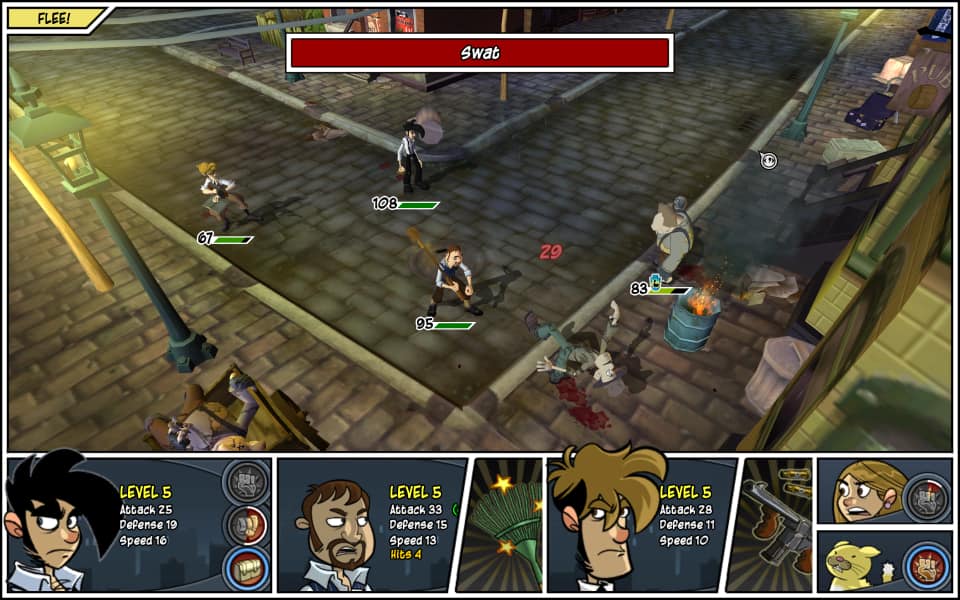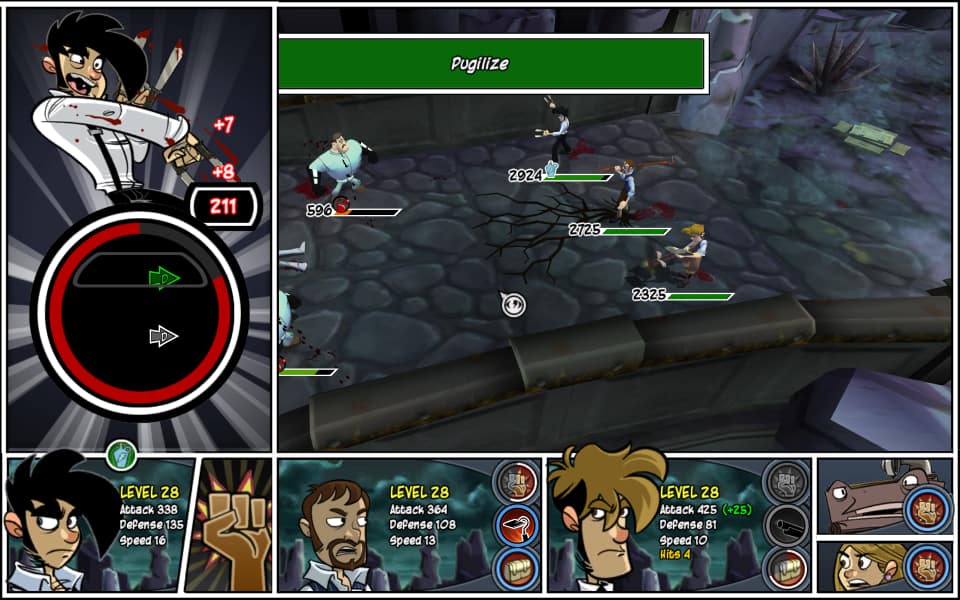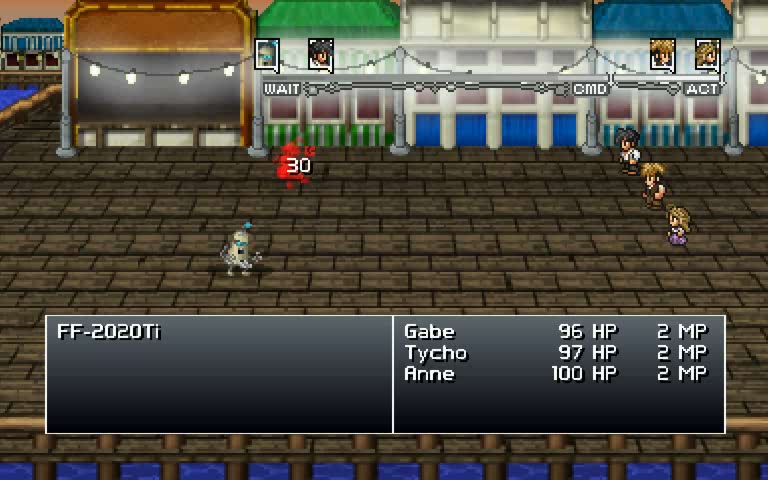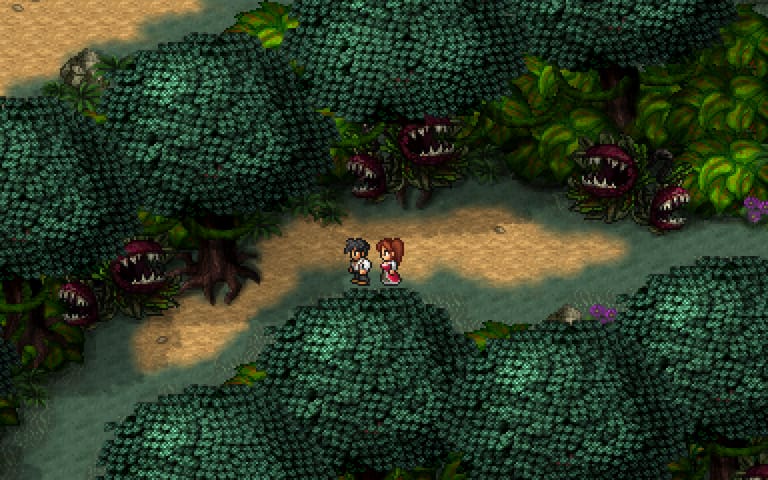Penny Arcade's On the Rain-Slick Precipice of Darkness
Penny Arcade's On the Rain-Slick Precipice of Darkness is another episodic series of games based on a web comic. These games are RPGs, not point and click adventures. Like the Homestar Runner comics, I wouldn't call myself a fan of Penny Arcade. To me, their humor is mostly a crapshoot, because half of their material is making in-jokes about games I don't have or aren't interested in.

Episode one puts you in the shoes of Carl, a man living in New Arcadia in 1923. On an otherwise great morning, a robot steps on your house, flattening it. To figure out what happened, you join the Startling Developments Detective Agency. Gabe, a violent fighter, and Tycho, a former apocalyptic scholar, are its only staff. If you're marginally familiar with Penny Arcade, you'll notice that the giant robot is an enormous Fruit F*cker juicer. The entire city is crawling with less imposing models. The story has you fighting your way across town, through Hobo Alley and Pelican Bay. The game ends with you killing a god.
The gameplay is pseudo-turn-based, where characters gain and spend action points in real-time. Heavy attacks require acing minigames with quick time events. This draws out combat for a much longer time than I think is necessary. Upgrades are acquired through Tycho's neice, Anne-Claire, who is a mad scientist.

Episode two is more of the same. The story takes you through an mental health asylum and a rich neighborhood (next to Hobo Alley). Eventually, you destroy the big robot that flattened Carl's house at the beginning of episode one. That robot was powered by a book, which a certain Dr. Blood steals immediately. Oh, and that robot is a god.
At this point, the development of the series stopped, and the series canceled. Later, it was completed in an entirely different style at great expense and at the last minute. And by "entirely different style", I mean "SNES-era turn-based RPG". I'm moot on the choice; I'm not particularly nostalgic about pixel art, but it works. Despite that, the story continues, and becomes significantly more dark and supernatural, but the game is still humorous, and I respect that.

The third episode starts with Gabe and Tycho in their agency. Carl is not present, for reasons explained in a DLC mission. I loved how this game features a costume swap option. I made everyone furries. After a while, you figure out that you need to stop four paintings from being recombined and freeing a god. Of course, they are being stolen by Dr. Blood. The game ends when you kill another god. (Notice a pattern?) This destroys most of the universe.
The last episode begins when everyone separates and falls to the Underhell. (It's below the Overhell. What happened to Hell? What the hell?) It's not the fire and brimstone type hell, more of "my life is a living hell" type hell. It looks nice, but most things are twisted and cursed in some way. Tycho pops in and out, but is not present for the majority of the game. Presumably, he is a ninja; kicking butt somewhere else. However, you discover some of his family's dark secrets, and about something called "The Long Project". Three pillars on Underhell support Overhell, and those will need to be destroyed. Kill god, game over.

I enjoy the strict turn-based combat of the last 2 games. The magic points don't all go away when you use an ability (unless specified otherwise). There are also special combat conditions, like no new magic points, extra points, or you win. I played on normal difficulty, and didn't have much trouble. It can be a little frustrating when I discover some potion or ability I already have that could have made my life much easier last time. It gets more frustrating when a boss constantly stuns you, and lets his minions tear you apart.
The creatures found in the last 2 games are very creative, especially the last. Most creatures in hell are a cross between one animal and another, and you will be fighting them most of the time. One boss is made of parts from about 5 or 6 others, including that red dangly thing roosters have.
The music in the first two episodes is the orchestral game soundtrack sound from the era. I love that style of soundtrack. The third episode has an early 90s synthesized sound, like a SNES. I expected more of the same in the last, but was immediately incorrect, as it has a rock (or maybe metal) sound that befits a hellish setting.
I breezed over a lot of the story points in these descriptions (like the The Quartet for the Dusk of Man). The story and characters are well written, I think. The majority of the characters have interlocking pasts and interesting personalities. None of them are particularly brooding, except maybe Tycho, but that's because he's the apocalypse prophet.
When I started playing these, I wasn't sure of what to expect. I like the high-res mid-aughts style of the first two, and like the gameplay of the last two. All are humorous, and fun, even if you aren't familiar with games like these.